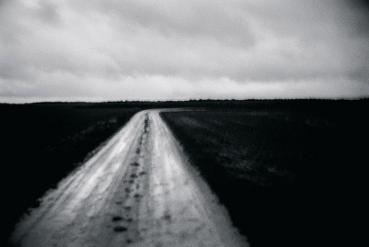Demain, dès l'aube.../ Tomorrow, At Dawn...
Victor Hugo

Demain, dès l'aube, à l'heure où blanchit la campagne,
Je partirai. Vois-tu, je sais que tu m'attends.
J'irai par la forêt, j'irai par la montagne.
Je ne puis demeurer loin de toi plus longtemps.
Je marcherai les yeux fixés sur mes pensées,
Sans rien voir au dehors, sans entendre aucun bruit,
Seul, inconnu, le dos courbé, les mains croisées,
Triste, et le jour pour moi sera comme la nuit.
Je ne regarderai ni l'or du soir qui tombe,
Ni les voiles au loin descendant vers Harfleur,
Et quand j'arriverai, je mettrai sur ta tombe
Un bouquet de houx vert et de bruyère en fleur.
Tomorrow, At Dawn...
___________________________________________________________________________________
Tomorrow, at dawn, at the hour when the countryside whitens,
I will set out. You see, I know that you wait for me.
I will go by the forest, I will go by the mountain.
I can no longer remain far from you.
I will walk with my eyes fixed on my thoughts,
Seeing nothing of outdoors, hearing no noise
Alone, unknown, my back curved, my hands crossed,
Sorrowed, and the day for me will be as the night.
I will not look at the gold of evening which falls,
Nor the distant sails going down towards Harfleur,
And when I arrive, I will place on your tomb
A bouquet of green holly and of flowering heather.
___________________________________________________________________________________
Source. (French) Source (English)
"À la lumière des événements qui ont marqué la vie de l’auteur, on comprend que ce poème est autobiographique et que Victor Hugo s’y adresse à sa fille Léopoldine, disparue quatre ans plus tôt, et dont il commémore la mort dans un pèlerinage annuel entre Le Havre et Villequier, le village de Normandie où elle s’est noyée et où elle est enterrée."
"Victor Hugo was devastated when his [...] daughter, Léopoldine, died at age 19 in 1843, shortly after her marriage. She was drowned in the Seine at Villequier, pulled down by her heavy skirts, when a boat overturned. Her young husband died trying to save her. Victor Hugo was traveling with his mistress at the time in the south of France, and learned about Léopoldine's death from a newspaper as he sat in a cafe. He describes his shock and grief in his poem À Villequier."
Information about the poet here + Biographie de Victor Hugo. L'auteur et son oeuvre + LISTE DES POÈMES DE L´AUTEUR.
Illustration: (”Le chemin des Dames”, photo de Gérard Rondeau) (De la république des livres)
